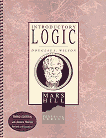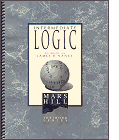
 |
 |
 |
Introductory & Intermediate Logic

These texts in the Mars Hill Textbook series from Canon Press were the first logic texts available to students studying logic lower than the university level. Douglas Wilson writes in Introductory Logic, “Logic is not devised by man, but neither is it created by God, like trees and stars are. Rather, it is an attribute of God which is reflected in creation.” (page 1.)
Both Introductory and Intermediate Logic are broken into sections; each section is further broken into its component ideas. These components are then explained directly, with examples. The explanation in the text is followed by a series of exercises to give the student practice in that component. The answers to the exercises are contained in a separate answer key. The concepts explained become clear to those willing to exert some effort studying the text, and what learning, really, comes without effort?
Introductory Logic covers statements and their relationships, syllogisms and validity, arguments in normal English, and infomal fallacies in these sections: statements, self-supporting statements, supported statements, relationships between statements, consistency and disagreement, the one basic verb, standard categorical statements, the square of oppositon, contradiction, contrariety, subcontraiety, subimplication, superimplication, arguments, truth and validity, the syllogism, mood of syllogisms, figure of syllogisms, testing syllogisms by counterexample, distributed terms, testing syllogisms by rules, immediate inferences, translating ordinary statements, parameters and exclusives, enthymemes, hypothetical syllogisms, fallacies of distraction, ambiguity, and form, and detecting fallacies.

Intermediate Logic is the next text in the series after Introductory Logic has been completed with comprehension. It covers definitions, propositional logic, formal proofs of validity, and truth trees in these sections: purposes and types of definitions, genus and species, extension and intension, methods and rules for defining, negation, conjugation, and disjunction, truth tables, the conditional, the biconditional, shorter truth tables, using assumed truth values, the dilemma, rules of inference, recognizing the rules of inference, developing formal proofs, rules of replacement, practice with proofs, the conditional proof, reductio ad absurdum, proving rules unnecessary, truth-functional completeness, and truth trees.
Have I answered your curriculum questions about Introductory and Intermediate Logic? If not, please ask me your question. I am sorry that I cannot tell you which curriculum to buy, but I try to describe the curriculum as completely as possible so that you can make up your mind as to which are best suited for your children.
Order Introductory Logic and Answer Key
Order Intermediate Logic and Answer Key
Return to Logic Curriculum Reviews
Return to Classical Christian Curriculum Reviews
Return to Online Catalog: Logic
Return to Classical Curriculum and Online Catalog
 |
 |
 |
 |
 |
 |
 |
| Contents | Introduction | Trivium | Grammar | Dialectic | Rhetoric | Homeschool |
 |
 |
 |
 |
 |
 |
 |
| FAQ | CE Links | Favorite | Reciprocal | What’s New | Search CCH | Art History |
![]()
Classical Christian
Homeschooling: Classical Education at Home
Site designed and maintained by Christine
Miller / This page last revised February 2000
Classical Curriculum & Online Catalog: Introductory and Intermediate Logic Review
http://www.classicalhomeschooling.org/curriculum/logic-wilson.html
Copyright © 1997-2000